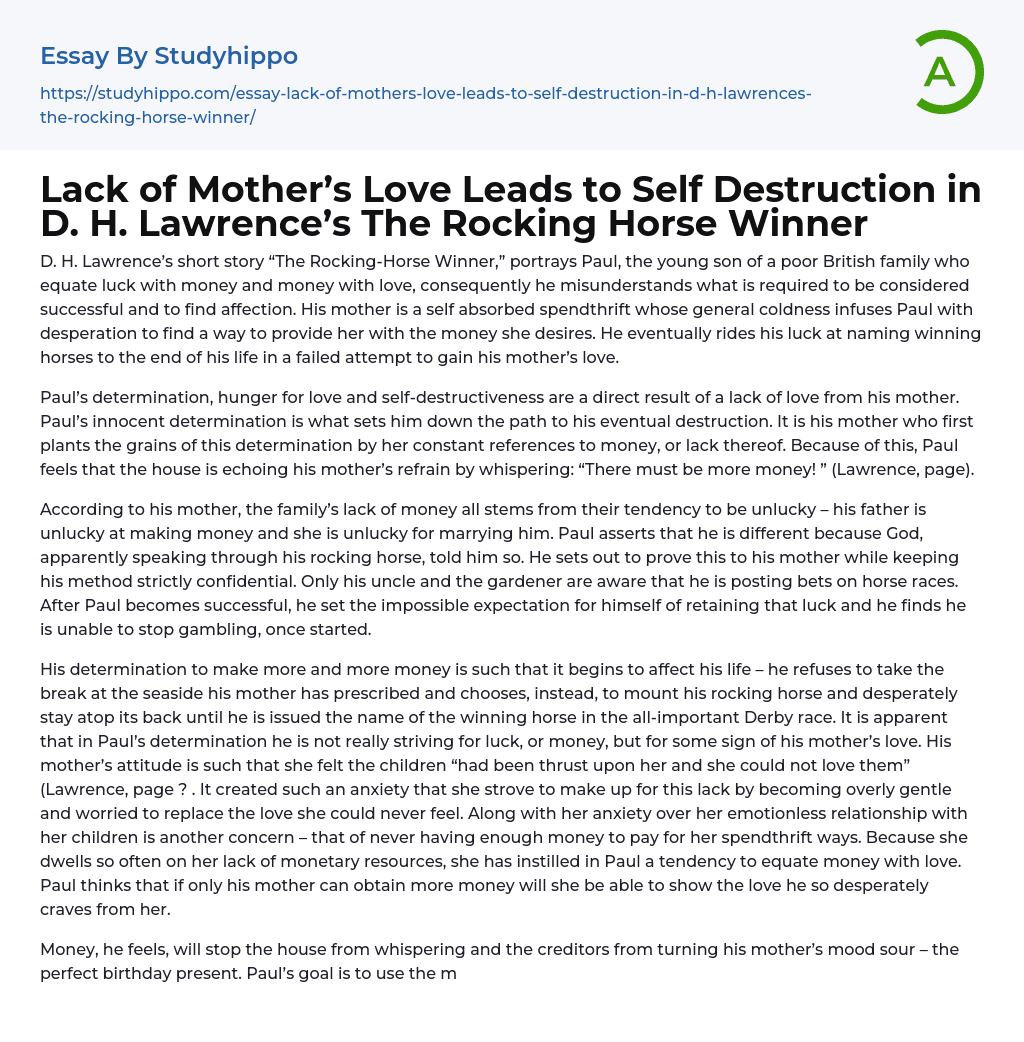D. H. Lawrence’s short story “The Rocking-Horse Winner,” portrays Paul, the young son of a poor British family who equate luck with money and money with love, consequently he misunderstands what is required to be considered successful and to find affection. His mother is a self absorbed spendthrift whose general coldness infuses Paul with desperation to find a way to provide her with the money she desires. He eventually rides his luck at naming winning horses to the end of his life in a failed attempt to gain his mother’s love.
Paul’s determination, hunger for love and self-destructiveness are a direct result of a lack of love from his mother. Paul’s innocent determination is what sets him down the path to his eventual destruction. It is his mother who first plants the grains of this determination by her co
...nstant references to money, or lack thereof. Because of this, Paul feels that the house is echoing his mother’s refrain by whispering: “There must be more money! ” (Lawrence, page).
According to his mother, the family’s lack of money all stems from their tendency to be unlucky – his father is unlucky at making money and she is unlucky for marrying him. Paul asserts that he is different because God, apparently speaking through his rocking horse, told him so. He sets out to prove this to his mother while keeping his method strictly confidential. Only his uncle and the gardener are aware that he is posting bets on horse races. After Paul becomes successful, he set the impossible expectation for himself of retaining that luck and he finds he is unable to stop gambling, once started.
His determination to make
more and more money is such that it begins to affect his life – he refuses to take the break at the seaside his mother has prescribed and chooses, instead, to mount his rocking horse and desperately stay atop its back until he is issued the name of the winning horse in the all-important Derby race. It is apparent that in Paul’s determination he is not really striving for luck, or money, but for some sign of his mother’s love. His mother’s attitude is such that she felt the children “had been thrust upon her and she could not love them” (Lawrence, page ? . It created such an anxiety that she strove to make up for this lack by becoming overly gentle and worried to replace the love she could never feel. Along with her anxiety over her emotionless relationship with her children is another concern – that of never having enough money to pay for her spendthrift ways. Because she dwells so often on her lack of monetary resources, she has instilled in Paul a tendency to equate money with love. Paul thinks that if only his mother can obtain more money will she be able to show the love he so desperately craves from her.
Money, he feels, will stop the house from whispering and the creditors from turning his mother’s mood sour – the perfect birthday present. Paul’s goal is to use the money he earns from gambling to buy his mother’s love. Unfortunately, Paul’s behavior becomes self-destructive. It is no longer good enough to give his mother a lump sum of five thousand pounds for her birthday; he feels obligated, instead,
to make the rest of her life worry-free by providing enough money that even she will be unable to spend it all in a short amount of time.
Paul’s plan backfires and “the voices in the house” (Lawrence, page ? ) suddenly go crazy “like a chorus of frogs on a spring evening” (page ? ). His luck seems to be running out and he finds himself unable to predict the next race’s winner. Paul feels he must push himself, and the rocking horse, harder and harder until the winner comes to him. In a frenzy now, Paul refuses to stop rocking the horse and he eventually does come up with a winning horse, but only at the expense of his own life.
The combination of Paul’s determination, hunger for love and self-destructive behavior are portrayed through third person narrative in D. H. Lawrence’s “The Rocking Horse Winner” and paint a chilling picture of the effects base emotion and lack of genuine emotion can inflict upon a family. If Paul’s mother had not been so possessed by greed, the tragic consequence of her son’s death might never have occurred. When greed replaces love, only dreadful events can possibly result.
- Adaptation essays
- Adventure essays
- Adversity essays
- Aging essays
- Alcohol essays
- Barbie Doll essays
- Beauty essays
- Care essays
- Carpe diem essays
- Change essays
- Chess essays
- Chicken essays
- Choices essays
- Contrast essays
- Crops essays
- Development essays
- Dream essays
- Evil essays
- Experience essays
- Family essays
- Farm essays
- Fire essays
- First Love essays
- Focus essays
- Greed essays
- Hero essays
- Holiday essays
- House essays
- Housing essays
- Humility essays
- Humor essays
- Hypocrisy essays
- Integrity essays
- Law of Life essays
- Life Changing Experience essays
- Life Experience essays
- Lifestyle essays
- Limitations essays
- Love Story essays
- Mother Tongue essays
- Motherhood essays
- My Neighborhood essays
- Myself essays
- Mystery essays
- Narcissism essays
- Never Give Up essays
- Nursing essays
- Object essays
- Opportunity essays
- Peel essays




